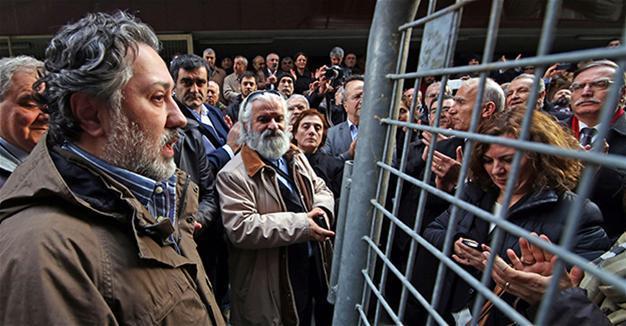Trial of Turkish daily Cumhuriyet journalists, executives continues on second day
ISTANBUL
 The trial of 17 executives and journalists from the daily Cumhuriyet, including the newspaper’s editor-in-chief Murat Sabuncu, Ahmet Şık, Kadri Gürsel and cartoonist Musa Kart, went on to its second day on July 25 with Sabuncu’s testimony which had been postponed from the first day of the hearing.
The trial of 17 executives and journalists from the daily Cumhuriyet, including the newspaper’s editor-in-chief Murat Sabuncu, Ahmet Şık, Kadri Gürsel and cartoonist Musa Kart, went on to its second day on July 25 with Sabuncu’s testimony which had been postponed from the first day of the hearing.Eleven of the 17, including Gürsel, Sabuncu, Kart and Şık, are held in custody on terror charges, while the others had already been freed.
The second hearing on July 25 began as Sabuncu testified after his plea had been adjourned over his statement that gendarmerie officers had confiscated documents and newspaper reports for the plea.
“This case is an intimidation for all journalists. The price of independent journalism in Turkey is to be arrested and put into jail,” Sabuncu said, noting that they had waited for the indictment to be prepared for five months and spent nine months for the hearing, facing a “serious isolation.”
He stated that the prosecutor who launched the investigation into the daily had been tried for being a member of the Gülen network but 10 percent of the daily had been detained as a part of the investigation.
Sabuncu also refuted claims of being a member of the “Cumhuriyet Foundation” named in the indictment and said he began to work at the daily in August 2014, taking responsibility for every story after that.
Regarding claims that he spoke with suspects who used ByLock, a messaging application used by the Gülen network, Sabuncu said a journalist would connect with anyone under the condition of keeping their distance.
“The indictment states that there are a total of 215,092 ByLock users. According to the indictment, I talked with 18 people which is one out of 18,000,” Sabuncu said.
The Cumhuriyet editor-in-chief noted that the main report on the July 15, 2016, failed coup attempt of the daily had been titled “Democracy is the solution,” but said it had not been mentioned in the indictment along with the editorial piece.
Sabuncu also said he had never visited U.S.-based Fethullah Gülen, accused of masterminding the failed coup attempt, and did not pen a single piece praising his work.
He added that Cumhuriyet journalists were people who were engaged in journalism with honor and pride.
Lawyer Bülent Utku was the second to testify before the judge after editor-in-chief Sabuncu.
Utku said the prosecutor aimed to create a perception on the society by smearing allegations of PKK links to the daily in order to launch an operation, thinking that the Gülen network would not be enough to justify the operation alone. He said none of the eight pieces mentioned in the indictment covered the PKK.
He said the idea of an operation against the daily had actually been based on a report the daily published about Turkey’s intelligence agency allegedly sending weapons to Syria on trucks in 2015.
Utku also added that changing the newspaper’s editorial policy was not the business of the prosecutors but readers.
He also questioned why a lawsuit had not been filed before if the mentioned reports had constituted a crime as printing houses sent every copy of the newspaper to all press prosecutors for review.
Utku said no one had the right to expose one to the fear of being a Gülen suspect after every phone call they made.
The charges directed at the Cumhuriyet journalists include “membership of an armed terrorist organization” and “helping an armed terrorist organization while not being a member of it.”
Prosecutors are seeking sentences between 7.5 and 15 years in prison for Dündar, Sabuncu, Gürsel, Aydın Engin, Bülent Yener and Günseli Özaltay for “helping an armed terrorist organization while not being a member.”
Akın Atalay, Mehmet Orhan Erinç and Önder Çelik are charged with “helping an armed terrorist organization while not being a member” and “abusing trust,” with the prosecutor demanding between 11.5 and 43 years in jail for them.
Between 9.5 and 29 years in jail is demanded for Bülent Utku, Kart, Hakan Karasinir, Mustafa Kemal Güngör and Hikmet Aslan Çetinkaya on the same charges as those directed at Atalay, Erinç and Çelik.
In addition, the prosecutor sought between 7.5 and 15 years in prison for Şık for “helping and being a member of the outlawed Kurdistan Workers’ Party [PKK] and the outlawed Revolutionary People’s Liberation Party-Front [DHKP-C].”
















